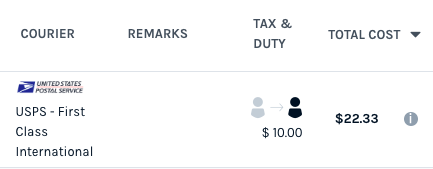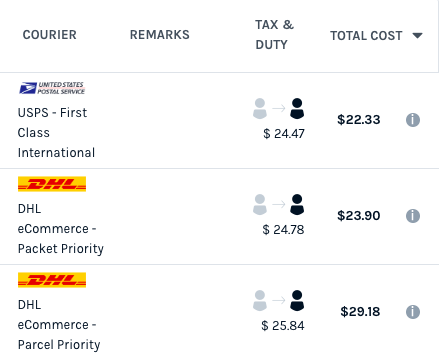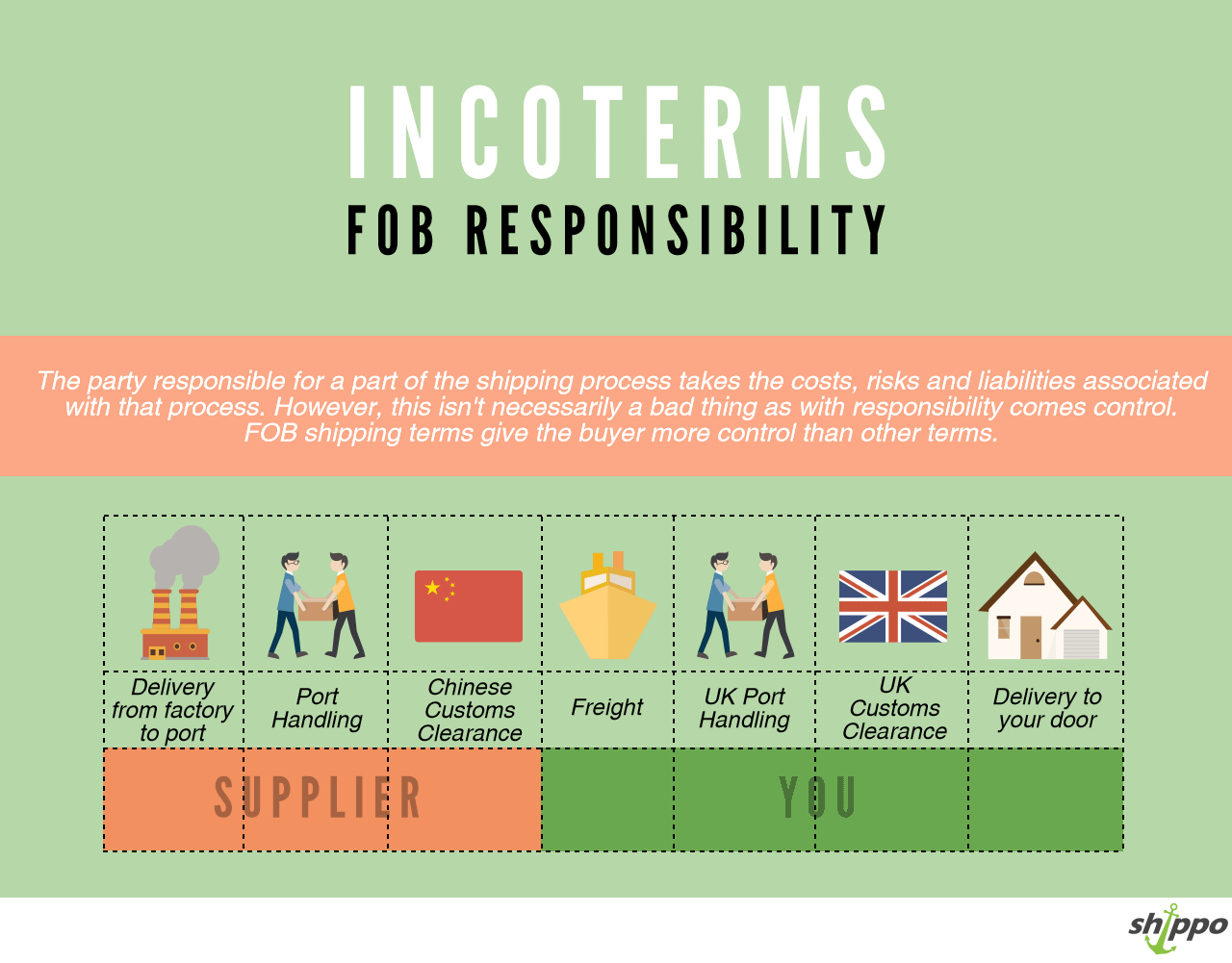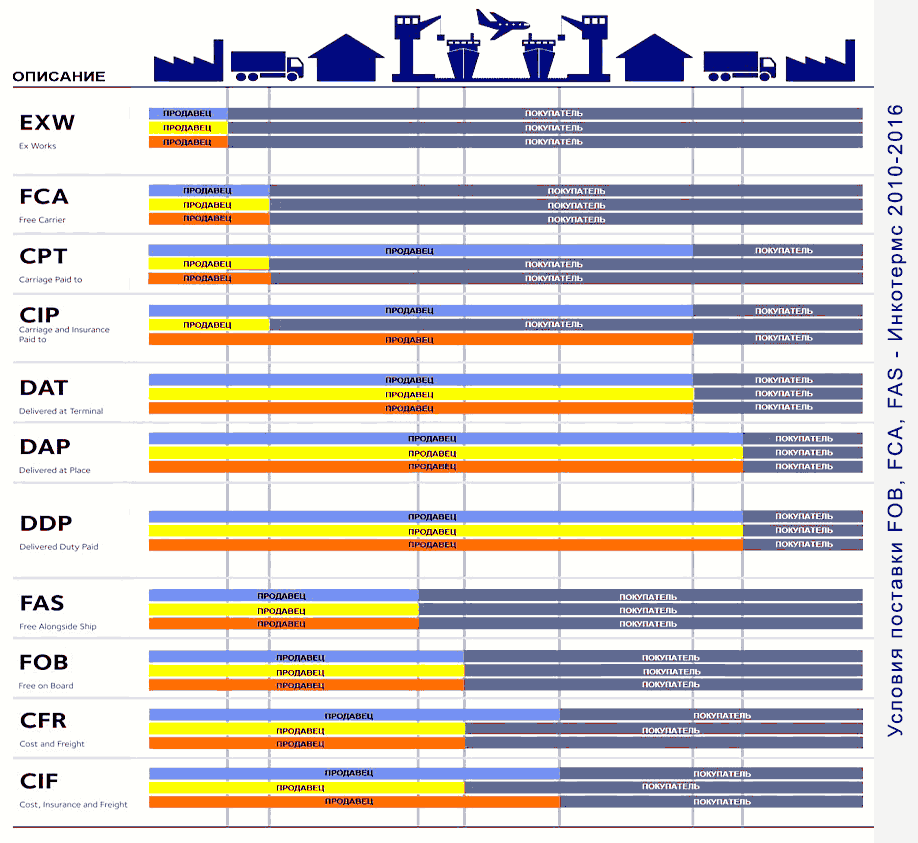Additional FAQ’s asked and answered by Shippo
What is the difference between FOB and CIF?
The difference between FOB and CIF shipping is the point at which responsibility for the shipment is passed between the seller and the buyer. When shipping on FOB (Free On Board) shipping terms, the supplier pays all the costs in the country of origin and the buyer takes responsibility once the goods are on board the ship. CIF (Cost, Insurance, Freight) shipping terms means that the supplier gets the goods to the buyer’s destination country with insurance included before the responsibility is transferred to the buyer. Costs are easier to control on FOB terms.
What is the difference between FOB and DDP?
The difference between FOB and DDP shipping terms is who is controlling the shipment. On FOB (Free On Board) shipping terms the buyer is responsible for the shipment from the goods being loaded onto the ship in the country of origin. DDP (Delivered Duty Paid) terms mean the seller will deliver the shipment to the location requested by the buyer and pay all the destination country’s duties on the buyer’s behalf. DDP is generally more expensive as there’s more risk for the seller.
(Click Question below to see our Answer)
For more information about Free on Board shipping call us now on 0203 384 0498 or use the chat facility above for a detailed explanation and advice on your shipping options.
Shippo Ltd
Which is Better FOB or CIF?
As mentioned earlier, customs departments will use either FOB or CIF as a valuation method to determine the taxable value of foreign imports.
Valuation methods differ for each country. If you want to know the valuation method for a particular destination, you can always find out from our Countries page.
Here’s an example of how shipping costs for a shirt can vary based on a country’s valuation method.
Calculating tax with the FOB method
Let’s say you want to ship a shirt, valued at $100USD, from the US to Australia. When getting a quote on Easyship, this USPS solution comes up.

Here’s how the tax & duty amount was calculated.
Australia’s tax & duty calculation method: FOBTax threshold: $0 AUDDuty threshold: $1000 AUD
Since the value of the item is $100USD, taxes but not duties will apply.
Australia’s tax rate (VAT/GST): 10%
Because we’re using the FOB method, the tax will simply be a percentage of the product price. The calculation will look like this:
$100USD item value x 10% tax = $10 import tax
Calculating tax with the CIF method
In this case, we’ll ship the same $100USD shirt from the US to the UK.

You’ll notice that shipping this item via USPS to Australia and the UK is the same rate. However, the tax & duty amount is different ($24.47 for the UK vs $10 for Australia).
The UK’s tax & duty calculation method: CIFTax threshold: £15 GBPDuty threshold: £135 GPB
Since the value of the item is $100USD, taxes but not duties will apply.
The UK’s tax rate (VAT/GST): 20%
Because we’re using the CIF method, the tax will be a percentage of the product price and the cost of shipping.
($100USD item value + $22.33 shipping cost) x 20% tax = $24.47 import tax
This also means the tax amount may vary, as it’s dependent on which courier you use. That’s why the tax amount is different if you use the DHL solution, as the tax calculation will be based on the $23.90 shipping cost versus USPS’ $22.33 shipping cost.
Преимущества Fob Shanghai для поставщиков
Fob Shanghai — это термин, обозначающий условия поставки товаров и определяющий ответственности, расходы и риски между поставщиком и покупателем. Для поставщиков существует несколько преимуществ в использовании Fob Shanghai:
- Огромный рынок: Шанхай является одним из крупнейших торговых центров мира, предоставляя поставщикам доступ к огромному количеству потенциальных покупателей из разных стран. Множество торговых ярмарок и выставок проходят в Шанхае, предоставляя возможности для привлечения новых клиентов и увеличения объема продаж.
- Экономическая эффективность: Использование условий Fob Shanghai позволяет поставщикам оптимизировать расходы на логистику и доставку товаров. Поскольку Шанхай расположен на важных торговых путях и имеет хорошо развитую инфраструктуру, доставка товаров в другие регионы мира становится более доступной и экономически выгодной. Это может помочь поставщикам удерживать цены на свои товары на конкурентоспособном уровне и привлекать новых клиентов.
- Надежность и безопасность: Шанхай известен своим качеством производства и надежностью поставок. Местные поставщики широко признаны благодаря строгому контролю качества и соблюдению международных стандартов. Использование условий Fob Shanghai позволяет поставщикам предоставлять своим клиентам гарантию надежности и качества предлагаемой продукции.
- Возможности развития и инноваций: Шанхай является центром развития и инноваций во многих отраслях, таких как информационные технологии, финансы и наука. Для поставщиков, работающих в этих отраслях, использование условий Fob Shanghai может открыть новые возможности для развития бизнеса и поддержку инноваций. Взаимодействие с местными предприятиями и инновационными центрами может способствовать повышению конкурентоспособности поставщика на мировом рынке.
В целом, использование Fob Shanghai для поставщиков представляет значительные преимущества, включая доступ к большому рынку, экономическую эффективность, надежность и возможности для развития и инноваций. Расширение бизнеса в Шанхае может помочь поставщикам увеличить объем продаж и укрепить свою позицию на мировом рынке.
What Does FOB in Shipping Terms Mean?
FOB means “Free On Board” or «Freight on Board.»
What the seller is responsible for: Getting the product on the ship and clearing it for export.
What the buyer is responsible for: Ensuring the shipment and handling the importation process, including paying for any import duties.
From a buyer’s perspective, it’s preferred to have goods delivered FOB because you will have more control over the freight and its costs. Should a problem arise during transport, your freight forwarder will be more responsive to you and your concerns, versus a forwarder that works for your supplier instead.
What is CIF delivery?
CIF means “Cost Insurance Freight.»
What the seller is responsible for: The cost of the goods being transported, having the goods insured, and paying the freight charges to deliver the goods to the buyer’s chosen destination.
What the buyer is responsible for: Unloading charges at the destination and any further shipping costs to the final destination.
Choosing to deliver goods by CIF is convenient if you’re new to importing and don’t have the capacity to explore your freight and insurance options. However, by leaving these tasks up to your seller/supplier, they will most likely mark up these costs to make a profit.
Additionally, should problems arise during transit, it may be difficult to get a resolution as you’ll be working with the supplier’s vendors. Since you’re not their client, they may be more reluctant to deal with your situation and not have your best interests in mind.

Scale Your Growth Internationally With Pro Tips
Learn how to ship internationally without missing a step. Our case studies show you proven tactics for shipping worldwide from Easyship users who did it right.
READ CASE STUDIES
What Is FOB Shipping?
In shipping, the term FOB means ‘Free on Board’ ️ and refers to a popularly used Incoterm. It’s usually the best way to control your shipping costs.Incoterms are essentially rules for International Trade; they allocate the division of responsibility between the Shipper (usually the supplier) and the Consignee (usually the buyer) in the process of shipping the goods from one to the other. There are many Incoterms, however, FOB trade terms are one of the most widely used to import products from Asia to the UK.
Under FOB shipping terms, the seller is responsible for all costs involved in the process up until the goods are on a vessel at the designated port. Once goods have been loaded onto the vessel the buyer is responsible for any costs and risks involved in the onward shipment.

FAQs on FOB Incoterms
What does FOB mean in export?
FOB in export refers to a standard set of rules in international trade process that is carried out by two parties from two distinct locations. Under FOB the exporter has to bear the cost and carry out the inland transportation till the goods reach the designated port and the buyer is responsible for the freight proceeding and the import arrangements after the vessel port.
What does FOB point mean?
FOB is a point is the agreed delivery spot between both buyer and seller for handover of goods where the peril of goods is moved from the seller to the buyer.
Who pays FOB destination freight?
As the responsibility under FOB transfers to the buyer after the goods are delivered at the agreed destination, the FOB freight charges are borne by the buyer.
Which is better CIF or FOB?
Under CIF the seller has more responsibilities and under FOB the buyer has more responsibilities. As a buyer or a seller whether CIF or FOB is better, depends on the cost you will incur for conducting the shipping process. For example, if the buyer can strike a better deal for shipping costs, he should go with FOB, and if he can’t then he should agree to CIF.
Does FOB include shipping?
Yes, FOB does include shipping, whereby the duty of carriage process resides with buyer, leading him to be accountable for all charges and security controls after the terminal port.
What is the difference between FOB shipping and FOB destination?
The difference is quite simple, FOB shipping involves the freight proceedings carried out by the buyer and FOB destination implies the agreed place of destination.
Does FOB include freight?
FOB does not include freight in seller’s set of responsibilities. Freight for taking goods to the destination port or the importer country’s port is to be borne by the buyer.
How is FOB value calculated?
In FOB, for a seller the cost or price will be the price of goods as decided by both parties, and it also includes the inland transit cost of goods since the delivery till the destination port is carried out by him. So, the buyer will bear all charges after the vessel leaves the port, he will cover freight proceedings after the destination port, and also carry the import customs & duty charges at the time of importing goods in his own country. FOB value for both buyer and seller can be calculated as per these costs incurred by them as per FOB rules.
The Benefits of FOB Terms
If you are concerned about keeping the shipping cost under control then the best way to do so is by buying your goods on FOB shipping terms.When arranging the shipping on FOB terms for importing, the buyer can control their costs as unexpected or hidden fees are visible/avoided from the outset. These can include problems with export licences (a possible Exworks issue) or handover charges (a possible CIF issue).
On FOB terms, all overseas responsibilities belong to the shipper (your supplier). Therefore, if there is a customs inspection due to a wrongful declaration it will be billed to the guilty party (the shipper/declarant) rather than you being hit with this cost.
More seasoned exporters in the Far East will offer FOB shipping terms as standard. A quick search on sites like Alibaba show that sellers often show the “FOB Price” of their goods so everyone knows where they stand. If the seller isn’t offering FOB terms the buyer can ask for them. If you have to ask for FOB terms the seller will probably add an extra charge to the agreed sale price. This reflects their increased costs but will not increase your total shipping cost as it’s just shifting some costs from you to them.
Инкотермс 2010-2016 — Условия поставки FOB, FCA, FAS
В компетенцию Условий поставки FOB, FCA, FAS Инкотермс 2010-2016 входит:
— Распределение транспортных расходов между продавцом и покупателем — определение, какие расходы и до каких пор несёт продавец, и какие, начиная с какого момента, — покупатель.
— Момент перехода рисков повреждения, утраты или случайного уничтожения груза с продавца на покупателя.
— Дата поставки товара — момент фактической передачи товара в распоряжение покупателя или его представителя, транспортной организации — выполнения или невыполнения обязательств по срокам поставки.
Одно из ключевых условий применения Инкотермс: регулирование момента перехода права собственности должно быть урегулировано в контракте отдельно, желательно, чтобы с переходом права собственности совпадал переход к покупателю риска случайной гибели или риска повреждения товара.
Области действия терминов Инкотермс 2010-2016. Условия поставки FOB, FCA, FAS:
Каждый определяемый термин является аббревиатурой (FOB, FCA, FAS), первая буква указывает на точку перехода обязательств и рисков от продавца к покупателю:
Группа F — основная перевозка не оплачивается продавцом (англ. main carriage unpaid), переход обязательств и ответственности на терминале отправления по основной перевозке груза. Продавец обязан предоставить товар в распоряжение перевозчика, нанимаемого покупателем самостоятельно — это условия поставки FCA, FAS, FOB.

Условия поставки FOB, FCA, FAS — Инкотермс 2010-2016
Условия поставки FOB, FCA, FAS:
1. FOB (free on board): груз или товар отгружается на борт судна, зафрахтованного силами покупателя, погрузо-разгрузочные работы оплачивает продавец.
2. FCA (англ. free carrier, франко-перевозчик): груз или товар передается основному перевозчику заказчика на указанный в договоре терминал отправления, затаможку и экспортные пошлины оплачивает продавец груза.
3. FAS (free alongside ship): груз или товар доставляется к борту судна зафрахтованного покупателем, в контракте указан порт погрузки, погрузо-разгрузочные работы оплачивает покупатель.
ZENAL LTD специализируется на обслуживании управления транспортом для компаний-производителей, оптовых фирм, дистрибьюторов, торговых компаний, которые получают продукцию из Китая, Индии, Египта, Турции, и др. стран. по направлению Украины, России, Беларуси, Молдовы, а также экспорта грузов.
Рассчитать стоимость отправки либо доставки контейнера возможно, заполнив форму!
What does FOB mean in shipping?
FOB stands for “free on board” or “freight on board” and is a designation that is used to indicate when liability and ownership of goods is transferred from a seller to a buyer.
Free on Board:
Free on board indicates whether the seller or the buyer is liable for goods that are damaged or destroyed during shipping. When used with an identified physical location, the designation determines which party has responsibility for the payment of the freight charges and at what point title for the shipment passes from the seller to the buyer.
In international shipping, for example, “FOB ” means that the seller (consignor) is responsible for transportation of the goods to the port of shipment and the cost of loading. The buyer (consignee) pays the costs of ocean freight, insurance, unloading, and transportation from the arrival port to the final destination. The seller passes the risk to the buyer when the goods are loaded at the originating port.
Freight on Board:
Freight on board is another term that is often used in place of free on board. However, it’s worth noting, this is not an official term.
Преимущества и риски при использовании FOB Шанхай
FOB Шанхай представляет собой условие доставки товара, при котором продавец осуществляет его поставку на борту судна в порту Шанхая. Этот термин широко используется во внешней торговле и имеет свои преимущества и риски.
Преимущества использования FOB Шанхай:
- Экономия на стоимости доставки: при использовании FOB Шанхай покупатель самостоятельно организует и оплачивает доставку товара с порта Шанхая в пункт назначения. Это позволяет продавцу сократить свои расходы и предложить более конкурентные цены.
- Ускоренные сроки поставки: благодаря условию FOB Шанхай, товар уже находится на борту судна в порту Шанхая, что позволяет ускорить его доставку до пункта назначения.
- Легкость в организации доставки: покупатель сам выбирает и контролирует логистическую компанию, которая осуществит доставку товара. Это дает ему большую гибкость и возможность выбрать наиболее подходящий вариант доставки.
Риски, связанные с использованием FOB Шанхай:
- Риск утраты или повреждения товара: с момента передачи товара на борт судна в порту Шанхая, ответственность за его сохранность и сохранность упаковки переходит на покупателя. Если товар потерян или поврежден во время транспортировки, покупатель несет финансовые потери.
- Необходимость организации доставки: покупатель самостоятельно осуществляет доставку товара с порта Шанхая до пункта назначения. Это требует дополнительных усилий и ресурсов для организации и контроля процесса доставки.
- Затраты на логистику: покупатель не только несет расходы на доставку товара, но и несет ответственность за выбор и организацию логистической компании. Неправильный выбор логистического партнера может привести к высоким затратам и задержкам в поставке.
Таким образом, использование условия FOB Шанхай имеет свои преимущества и риски, которые необходимо учитывать при проведении внешнеторговых операций
Поэтому важно тщательно анализировать каждую ситуацию и выбирать наиболее подходящее условие поставки в зависимости от конкретных потребностей и особенностей бизнеса
Все, что нужно знать об этом торговом термине
FOB Шанхай — это торговый термин, который указывает на ответственность продавца до момента погрузки товара на судно в порту отправления. Этот термин используется в международной торговле и имеет определенные особенности и правила, которые необходимо знать при организации международных поставок.
Определение: FOB (Free On Board) означает, что продавец должен доставить товар до грузовых ограничений судна в порту отправления. По достижении этой точки, покупатель становится ответственным за все расходы и риски связанные с доставкой товара до места назначения.
Цена и условия: Цена указанная для товара на условиях FOB Шанхай включает все расходы продавца, связанные с доставкой товара до порта отправления, включая погрузку на судно. Однако расходы по доставке товара до места назначения не включены в эту цену и будут нести покупатель.
Термин поставки: FOB Шанхай является одним из многих торговых терминов, которые регулируют отношения продавца и покупателя в международной торговле. Этот термин подразумевает, что товар становится собственностью покупателя после погрузки на судно в порту отправления.
Развитие и применение: FOB Шанхай является одним из наиболее распространенных торговых терминов и широко используется в торговле продуктами из Китая. Благодаря развитию международной торговли и увеличению числа грузовых перевозок, этот термин остается актуальным и востребованным.
Разные вариации: FOB Шанхай имеет несколько вариантов, которые могут быть использованы в зависимости от конкретного контракта и соглашения между продавцом и покупателем. Некоторые из этих вариаций включают FOB Поднебесная, FOB Китай, FOB порт Китая и т. д.
Плюсы и минусы: Использование термина FOB Шанхай имеет свои преимущества и недостатки. Среди преимуществ можно выделить более прозрачные условия сделки, оплату поставляемого товара по факту его отправки и более гибкую систему ценообразования. Однако, с увеличением ответственности покупателя за доставку товара до места назначения, возникают дополнительные расходы и риски для покупателя.
Вывод: FOB Шанхай — это торговый термин, который определяет ответственность продавца до момента погрузки товара на судно в порту отправления. Этот термин имеет свои особенности и правила, которые необходимо учитывать при организации международных поставок. Ознакомившись с этим термином и его вариациями, продавцы и покупатели смогут более грамотно и эффективно осуществлять торговые операции на международном рынке.
How is “FOB” used in shipping documents?
The term “FOB” is used in four different ways when it comes to freight shipping. These include:
- FOB , Freight Collect
- FOB , Freight Prepaid
- FOB , Freight Collect
- FOB , Freight Prepaid
To understand each designation, we must first understand the difference between place of origin and place of destination and freight collect vs. freight prepaid. The first part of the designation determines where the buyer assumes title of the goods and the risk of damage from the seller (either at the moment the carrier picks the goods up for delivery or at the time of actual delivery). The second part indicates responsibility for freight charges. “Prepaid” means the seller has paid the freight; “collect” indicates the buyer is responsible for payment.
Place of Origin vs. Place of Destination:
Place of origin means the buyer assumes ownership of the shipment the moment the carrier picks up and signs the bill of lading while place of destination means the seller retains ownership and control of the goods until they are delivered. By denoting who “owns” the shipment, there is no ambiguity in responsibility of shipment. Freight Collect vs. Freight Prepaid:
Freight collect means the person receiving the shipment is responsible for all freight charges. They also assume all risks and are responsible for filing claims in the case of loss or damage.
Freight prepaid is the opposite. The shipper accepts responsibility for all freight charges and risks.
What is a shipping agreement?
Basically, a shipping obligation determines which party, the buyer or seller, is responsible for the order while it is in transit between shipment and delivery.
This is especially significant in situations of cross-border trade. This is because the shipments typically travel through international waters and are subject to different rules and regulations. Having everything clearly documented in terms of who is responsible for what helps to minimize any potential issues.
Shipping contracts can also include other terms, such as delivery details, pricing, and so forth. However, when you’re dealing with large orders, especially international ones, determining the obligation and liability of who is responsible for any potential damages during shipping is very important.
As you negotiate deals with buyers, you need to make it clear what sort of shipping liability obligations your business is willing and able to support. For example, if you prefer to hand off responsibility before transit, that needs to be made known while you’re negotiating shipping agreements with your customer.
Luckily, standard shipping agreements are spelled out in the International Chamber of Commerce’s Incoterms documentation. Let’s take a look at the two most popular shipping agreements, CIF and FOB, to give you a better idea of how these work.
FOB VS Ex Works Shipping Terms
Ex works shipping terms are another widely used incoterm. On these terms you as the importer are responsible for all costs from your supplier door, to your address in the UK. These are the second most commonly used term, and are another great way to ensure your import costs are transparent.
Our shipping terms showdowns allow you to directly compare two shipping terms that can be used when importing cargo via sea freight to the UK. In this head-to-head we look at FOB and Ex Works shipping terms.
FOB and Ex Works terms can both be used to ensure you know all of your costs from the start of the shipping process all the way up to receiving your goods. Ex Works terms leave all responsibility and risk in the hands of the buyer, whereas FOB terms split the responsibility down the middle.
FOB Advantages
- Manage your costs without hidden extras throughout the process
- Your supplier should know the export documents they need for their products
- Most sellers work to FOB terms as standard
Ex Works Disadvantages
- You are responsible for all risks from your suppliers premises to your door
- Costs not as clear without investigation
- You are liable for any costs incurred at customs for incorrect declarations by your supplier
There are positives and negatives for both shipping terms and this showdown does not have a winner by knockout, it’s definitely a judge’s decision! At Shippo we believe FOB shipping terms are the advisable option for a first time importer shipping goods to the UK via sea freight. This is because both you and your supplier know what’s required of them from the outset and you can get a simple quote from us and your supplier that includes all you need. Ex Works can be almost as simple but there is slight uncertainty when you are negotiating with your supplier as to the exact export documents you’ll need to clear the goods through the local Customs.
As a judge’s decision you may choose Exworks terms as the winner and if this is the case your shipment can be organised just as easily by us here at Shippo. Just give us a bit of extra time to establish the exact costs whilst our agent checks out the requirements in China, India, Taiwan or wherever your cargo is shipping from.
The key differences between CIF and FOB
The main difference between CIF and FOB is the party that is responsible for the goods while they are in transit. With a CIF agreement, the seller is liable for the goods during transit, and with a FOB, the buyer is liable for the goods during transit. Other than that, there is not a major difference between the two.
Generally, FOB is considered a more cost-effective approach. This is because buyers can make more cost-effective decisions about the shipment, such as buying the minimum insurance policy or going with a lower-cost freight company, since they are in control.
When sellers use CIF and claim liability, they are less likely to cut corners since they are dealing with another party’s goods, which can lead to larger expenses.
Подводя итоги: важность понимания Fob shanghai и условий поставки
Трактовка Fob shanghai
Fob shanghai — это условия поставки товара, при которых обязанности и расходы по доставке товара со стороны поставщика заканчиваются в момент погрузки товара на судно в порту Шанхая. То есть, поставщики перевозят товар до указанного порта и производят его погрузку на судно, после чего все риски и обязанности переходят на покупателя.
Условия Fob shanghai подходят, когда покупателю удобно самостоятельно организовать таможенное оформление и перевозку товара до места назначения. Такой подход может быть полезен при большом объеме груза и желании покупателя полностью контролировать весь процесс доставки.
Документы и обязанности
При использовании условий Fob shanghai, поставщики обязаны предоставить определенные документы, необходимые для таможенного декларирования и перевозки товара. К таким документам могут относиться:
- Товарная накладная;
- Счет-фактура;
- Сертификаты соответствия;
- Пакеты документов, связанных с морской перевозкой и таможенным оформлением.
Эти документы передаются покупателю через банк или другой удобный способ и используются для оплаты товара, его таможенного оформления и погрузки на судно.
Пример применения Fob shanghai
Для лучшего понимания условий Fob shanghai рассмотрим пример. Пусть у нас есть контракт между экспортером из Шанхая и покупателем из другой страны. В договоре указывается, что условия поставки товара — Fob shanghai.
Итак, поставщик организует доставку товара до порта Шанхая и оплачивает его погрузку на судно. После этого все расходы и риски переходят на покупателя. Покупатель организует таможенное оформление товара и его доставку до места назначения. Он также обязан оплатить стоимость товара и любые дополнительные расходы, связанные с доставкой и таможенным оформлением.
Таким образом, понимание и правильная трактовка условий Fob shanghai важны для обеих сторон сделки. Это поможет избежать возможных проблем и конфликтов при организации поставки товара из Китая.




















![Free on board [fob] incoterms explained in depth | 2023 guide](http://vsenazapad.ru/wp-content/uploads/9/6/1/9619a1bfd5118d4956f2eb699b7584ec.png)







